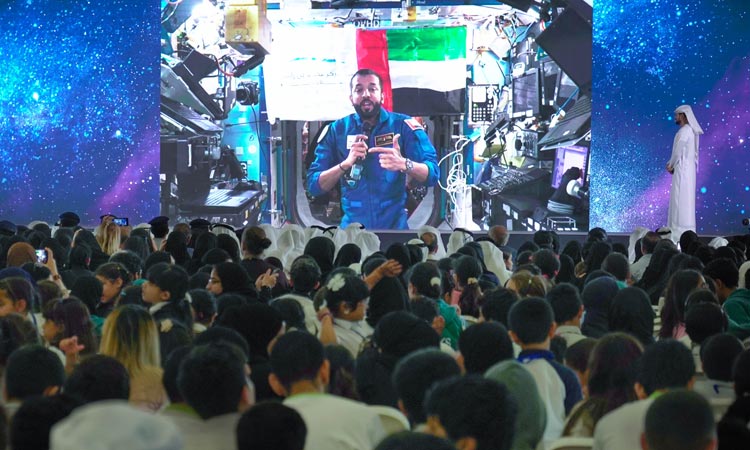DUBAI, 12th June, 2023 (WAM) – When the UAE’s Sultan AlNeyadi stepped outside the airlock of the International Space Station to begin a seven hour spacewalk over a month ago, he etched his name in history books as the first Arab astronaut to venture into the unknown depths of space. The remarkable feat was the highlight of the Arab world’s longest space mission, Zayed Ambition 2, one of a series of ambitious projects that have entrenched the UAE’s place in the orbit of elite spacefaring nations.
AlNeyadi’s journey to the ISS announced the country’s aspirations to be a major player in the world of crewed space flights. Despite being a relatively new entrant into the club of spacefaring nations, the UAE seeks to launch human space missions every three to five years, a goal that is one among a long list of groundbreaking space projects.
The role of the founding fathers
“The remarkable achievements of the UAE National Space Programme have been made possible by the vision of the country’s founding fathers and the strategic investments made by its current leadership in developing the infrastructure, technologies and talent needed to make it a frontrunner in the global space industry,” says Hamad Obaid AlMansoori, Chairman of the Mohammed Bin Rashid Space Centre (MBRSC).
In a tribute to its founding fathers, the UAE’s crewed missions were named after the late Sheikh Zayed, the Father of the Nation, whose passion for space shaped national aspirations in the sector. The early vision for the UAE National Space Programme was formulated by Sheikh Zayed who held many meetings to discuss space in the 70s, including a memorable gathering in Abu Dhabi with three American astronauts. The UAE’s first lunar rover, built by Emirati engineers, was named ‘Rashid’ after the late Sheikh Rashid bin Saeed Al Maktoum, the architect of modern Dubai.
Consistent with the ambitious vision of the country’s founding leaders, the UAE has made massive investments in groundbreaking projects in the space sector Last year the UAE Space Agency announced an AED3 billion ($816 million) investment fund for the development of the UAE’s capabilities in the sector.
Building a space industry from scratch
The Mohammed Bin Rashid Space Centre (MBRSC), an organisation launched in 2006, has been at the centre of efforts to catapult the UAE into the big league of space powers. MBRSC jump-started the development of an advanced space industry from scratch in a short period. The UAE’s ambitious goals meant that MBRSC had to create the advanced technological and scientific capabilities, innovation and knowledge needed to be a space power in a short period of time.
“Starting with just five engineers, MBRSC put together a comprehensive programme to develop the sophisticated capabilities needed to undertake ambitious space missions. MBRSC also forged collaborations with a multitude of entities, both in the public and private sector, including other space agencies, international organisations, and universities and faculties specialising in space science. With rapidly created local capacities, the MBRSC launched a range of trailblazing space missions covering advanced indigenous satellites, interplanetary missions and crewed space journeys,” says HE Hamad Obaid AlMansoori.
UAE Satellite Programme
The maiden project undertaken by MBRSC was the development of the country’s first satellite as part of the UAE Satellite Programme. A team of Emirati engineers worked closely with South Korean experts to design and manufacture the country’s first two observation satellites, DubaiSat-1 and DubaiSat-2 launched in 2009 and 2013 respectively, and its first nanosatellite, Nayif-1.
In October 2018, the MBRSC built and launched the first 100% UAE-designed and manufactured Earth observation satellite KhalifaSat, cementing the country’s position amongst leading space technology manufacturers. The launch of the satellite saw the UAE’s emergence as a new player in the satellite imaging data market. KhalifaSat’s high-resolution images of Earth can be used for everything from urban planning to disaster relief. In 2024, MBRSC plans to launch MBZ-SAT, a satellite that will break new ground in high-resolution imaging from outer space.
Interplanetary missions
In 2014, the UAE announced the Emirates Mars Mission, also known as Al Amal, a project to send the Arab world’s first mission to the red planet. The UAE’s first excursion into deep space, the mission became a reality in February 2021 when the Hope Probe successfully entered orbit around Mars. Since then, the extraordinarily complex interplanetary mission has generated unique insights that have added significantly to the global body of knowledge about the Martian atmosphere.
In another landmark initiative, the UAE announced in 2017, the ‘Mars 2117’ programme led by MBRSC to develop the first ever human settlement on the red planet in the next 100 years. Driven by the passion of the UAE's leadership to uncover new knowledge, the project represents a major contribution to humanity's interplanetary endeavours.
Crewed missions
The UAE’s space forays have been driven by a number of programmes created to develop national talent in various areas of the industry. Six years ago, MBRSC launched the UAE Astronaut Programme to prepare Emirati astronauts for manned missions to the International Space Station (ISS) and other destinations in space. In the first initiative of its kind in the Arab world, the Programme focused on providing training, expertise, and qualifications for Emiratis to represent the UAE and the Arab world in future space missions and conduct scientific experiments that support global space exploration.
In 2018, astronauts Hazzaa AlMansoori and Sultan AlNeyadi were selected to form the first batch of the UAE Astronaut Programme, while the second batch selected in 2021 featured Nora AlMatrooshi, the first female Arab astronaut, and Mohammad AlMulla. In September 2019, the UAE sent its first astronaut to the International Space Station, making Hazzaa AlMansoori the first Arab to visit the orbiting laboratory. This was followed by the Zayed Ambition 2 mission featuring Emirati astronaut Sultan AlNeyadi, which arrived at the International Space Station in March this year.
Global player
The outcomes of these ambitious projects have transformed the UAE’s standing in the global space landscape. MBRSC’s missions have led to the development of new technologies and innovations that have applications in various industries, says Hamad Obaid AlMansoori. The Emirates Mars Mission, for example, has spurred the development of technologies in fields such as robotics, autonomous systems, and remote sensing, which can be applied to industries like agriculture, mining, and oil and gas.
Over the course of more than two years, the Emirates Mars Mission has also provided never-before-seen insights into the Martian atmosphere, which have enhanced understanding of the planet's history and evolution. The Hope Probe has collected over 1.7 TB of data on the Martian atmosphere, weather patterns and climate history, providing critical information that will help predict climate changes on Earth and support future Mars missions and planetary explorations.
Another project, the UAE Analog Mission, an offshoot of the Mars 2117 programme, is also playing a vital role in preparing humans for future exploration of Mars and other planets. By simulating space-like conditions on Earth, the Mission is contributing to advancing spaceflight research by enabling space scientists to conduct experiments, develop countermeasures for space-hazards, and test new technologies. The first UAE Analog Mission, the eight-month SIRIUS-21 programme, was completed by Emirati crew member Saleh AlAmeri in July 2022, after achieving all its objectives to test the effects of isolation on human psychological and physiological conditions.
Similarly, the UAE Astronaut Programme through its missions to the ISS is supporting research in fields such as biomedical science, transportation and manufacturing, which can be leveraged to improve life on Earth. At the ISS, Sultan AlNeyadi is conducting more than 200 experiments assigned by NASA and 19 by UAE universities on diverse topics including cardiovascular and immune systems, back pain, epigenetics, fluid science, plant biology, material science, sleep analysis and radiation.
Over the last couple of months, AlNeyadi has shared on social media photos of the unique experiments he is conducting on board the ISS. Experiments that have caught the interest of the public include the cultivation of tomatoes in space for scientific studies. His botanical space experiment seeks to understand how plants and vegetables can be grown in a microgravity environment and whether they could provide astronauts with a sustainable food source in the future. AlNeyadi is also conducting experiments that may provide potential treatments for neuro-degenerative diseases like Alzheimer’s.
Thriving space ecosystem
MBRSC’s satellite projects and interplanetary missions are helping create the strong base necessary for the UAE space industry to be a top-ranked global player, notes Hamad Obaid AlMansoori. “The Centre’s programmes are fostering the development of a large pool of UAE national talent and competencies in various areas of the space industry and space exploration, the creation of new economic opportunities and industries in the UAE, and the advancement of scientific knowledge through research and development,” he said.
Further, MBRSC's partnerships and collaborations with international organisations are providing opportunities for UAE nationals to work on joint projects and gain international experience and expertise, which will contribute to the development of the space industry ecosystem in the UAE.
The MBRSC’s Space Ventures initiative, a project launched under the umbrella of the Mars 2117 programme, serves as a launchpad for promising startups in the space sector by facilitating partnerships with the Centre on long-term projects, and providing them with the regulatory know-how and technology to attain viability and sustainable growth for the future. MBRSC offers a high-level work environment for partner companies and gives them access to the Centre’s expertise in space research and exploration, creating channels with space tech specialists and networks.
Adding value to the economy
The manufacture of satellite components and development of local expertise in the field has led to the creation of new job opportunities and contributed to the growth of the UAE economy. The development of MBZ-SAT, for example, has been pivotal in supporting the rapid expansion of the local space industry. As much as 90% of the mechanical structure and 50% of the electronic modules of MBZ-SAT are being built in the UAE. MBRSC has collaborated with local companies such as aerospace manufacturing company Strata, engineering solutions company EPI, Rockford Xellerix, Halcon and Falcon Group to manufacture and supply the components necessary for the development of the new satellite. Recently local company Strata Manufacturing achieved a historic milestone by indigenously manufacturing aluminium honeycomb panels required for building satellites, in partnership with MBRSC.
These outcomes are helping build a strong and sustainable UAE space sector that contributes to the diversification and growth of the economy. The growing industry ecosystem has helped boost the UAE’s scientific and technological capabilities and engrained a culture of innovation in the sector.
Commercial services
In a short period of time, the UAE has also become a notable player in the global commercial space services landscape. The expertise gained in designing, manufacturing, assembling, and launching a number of satellites over the years has enabled it to provide diverse services to countries around the world. These include ground station services covering satellite tracking, telemetry, and command operations and state-of-the-art products and services in geo-science and remote sensing.
The Centre provides end-to-end earth observation solutions through its fleet of satellites, including KhalifaSat, one of the world’s most technologically advanced remote sensing satellites. Featuring Artificial Intelligence and big data analytics, these services support project monitoring, 3D mapping, monitoring and analysis of environmental conditions, disaster management and much more.
MBRSC employs its cutting-edge technologies to conduct research and solve problems in a wide range of areas, including providing information on urban land cover and changes over time. This has helped monitor project construction progress including big projects such as Expo 2020 Dubai, the Dubai Canal and artificial islands. The Centre has also collaborated with Al Ain Municipality to develop AI technology for analysing palm tree cover in various regions. MBRSC was able to detect 45,000 trees in less than a week, with an accuracy of 98.7%.
Through images from its sophisticated satellites, MBRSC also supports the management of water, land surfaces, aquatic ecosystems and biodiversity. MBRSC is a part of Sentinel Asia, an international initiative for applying remote sensing and Web-GIS technologies to support disaster management in the Asia-Pacific region. Over the years, it has harnessed space technologies that help mitigate the impact of natural and man-made disasters.
Other commercial services provided by MBRSC include training and education programmes to help countries and other entities develop their space capabilities. As part of a collaboration with the United Nations Office for Outer Space Affairs (UNOOSA), MBRSC is providing opportunities to host a payload on its 12U PHI modular satellite platform, for which they have already signed agreements with Bahrain and Nepal. The Centre has also signed a framework agreement with Mauritius for significant space development and satellite technology-related R&D growth.
Future missions
Not content to rest on its laurels, MBRSC has started planning for new large-scale interplanetary missions that are set to further accelerate the nation’s space engineering, scientific research and exploration capabilities.
Over the next decade, the UAE is set to cross new frontiers in space, propelling a transformation of local technology, innovation and skills in the sector. The country’s determination to undertake complex missions that few countries have attempted, let alone succeeded, is set to make it a frontrunner in the global space economy expected to reach $1 trillion in value by 2040.















:quality(70)/cloudfront-eu-central-1.images.arcpublishing.com/thenational/UVHAOYQFR7GXMOOSDZUXFQD5XE.jpg)
:quality(70)/cloudfront-eu-central-1.images.arcpublishing.com/thenational/BW6HJ4AAOV4HMBDM623CDY2USI.jpg)
:quality(70)/cloudfront-eu-central-1.images.arcpublishing.com/thenational/OHQYH7B4GRSB6KXMNHOD7XZ2VY.jpg)